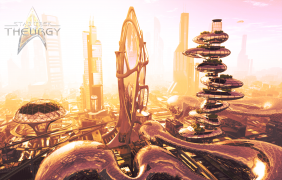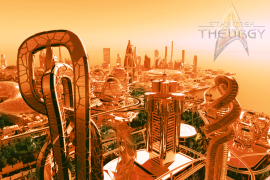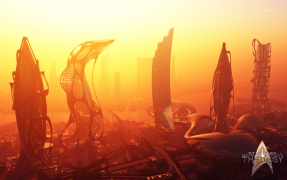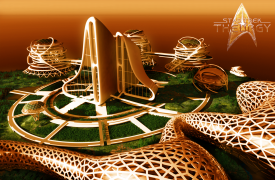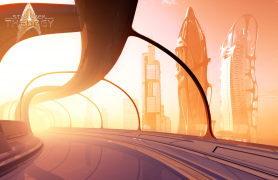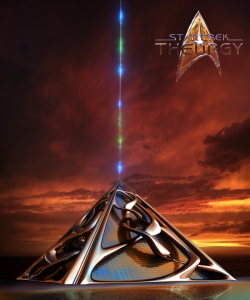Aldea: Difference between revisions
From Star Trek: Theurgy Wiki
Auctor Lucan (talk | contribs) |
Auctor Lucan (talk | contribs) |
||
| Line 73: | Line 73: | ||
==Aldea's Population== | ==Aldea's Population== | ||
[[File:Tamren-02.png| | [[File:Tamren-02.png|250px|thumb|right|''Image: Aldean male in 2381, wearing a chlamys and arm-mounted communicator.'']]Given the centuries of gradually increasing sterility, Aldea's surface was littered with ghost cities of varying size and degree of decay. The entirety of Aldea's indigenous population had withdrawn to the Aldea Prime long before the ''[[USS Enterprise-D|Enterprise]]'' encountered the planet in 2364. In 2381, these ghost cities housed bands of brigands and pirates that leached off transports and shuttle traffic on- and off-planet. While consisting of many different species, these bands of illegal immigrants on the planet were becoming more and more organised, and increasing in numbers. Their main ambition was to overcome unique scientific discoveries and prototypes made by the [[Aldean]] units, so they could be sold to the highest bidder on the interstellar black market. These bands were something that the [[Klingon]] Defence Force helped the Aldeans eradicate to the best of their abilities, but as of 2381, the problem still persisted. | ||
In the remaining, bustling city of Aldea Prime, the purebred Aldeans and the gestalts lived their life of scientific and artistic discovery, while the Klingons defended the city from on- and off-planet threats. There were about 10 000 Klingons living in the city as well as the ships in the [[Epsilon Mynos System]]. Besides Aldeans, Klingons and the brigands in the wastelands, there were about 200 000 temporary residents from other worlds in the city. Getting merchant or work permits and access to the city was a complicated matter for those who sought to visit in such capacities, while tourism was regulated by high entry fees and background screening. Given the previously mythical status that Aldea held in the galaxy, there were a lot of explorers and fortune-seekers coming to the planet. Given the close resemblance to Humans and the monetary compensation for donating to the Gestalt Program's gene pool, these visitors were often hand-waved through customs and visiting protocols - despite how this might become a [[security]] issue. There were, of course, Humans who sought to live permanently on Aldea, and they were the only individuals considered for [[Aldean]] citizenship. | In the remaining, bustling city of Aldea Prime, the purebred Aldeans and the gestalts lived their life of scientific and artistic discovery, while the Klingons defended the city from on- and off-planet threats. There were about 10 000 Klingons living in the city as well as the ships in the [[Epsilon Mynos System]]. Besides Aldeans, Klingons and the brigands in the wastelands, there were about 200 000 temporary residents from other worlds in the city. Getting merchant or work permits and access to the city was a complicated matter for those who sought to visit in such capacities, while tourism was regulated by high entry fees and background screening. Given the previously mythical status that Aldea held in the galaxy, there were a lot of explorers and fortune-seekers coming to the planet. Given the close resemblance to Humans and the monetary compensation for donating to the Gestalt Program's gene pool, these visitors were often hand-waved through customs and visiting protocols - despite how this might become a [[security]] issue. There were, of course, Humans who sought to live permanently on Aldea, and they were the only individuals considered for [[Aldean]] citizenship. | ||
Revision as of 11:36, 13 May 2019
Aldea, also known as Epsilon Mynos III, was a independent planet in the Epsilon Mynos System. A supposedly mythical world whose inhabitants constructed a planet-wide cloaking device to hide their planet from marauders. This was until 2364, when the USS Enterprise-D deactivated the cloak and the defence system for them, since the antiquated technology - while immensely powerful - had destroyed the ozone layer of the planet. When this defence system was deactivated, the sky ceased to be purple, and took on Aldea's natural gold and and red colours, which came from the reddish dust particles collected beyond the clouds of the planet - just below the atmosphere.
Since then, the Aldeans struggled to repopulate their world after generations of gradual decline. They had to repair the ozone layer, and find allies in a galaxy that was very keen to discover what Aldea had to offer, ranging from the more amiable Federation to opportunists like the Orion Syndicate and the Ferengi. After a time of great turmoil, Aldea found an ally in the Klingon Empire, and traded bits of their science and knowledge of the galaxy with the Klingons for protection.
As of 2381, Aldea remained in alliance with the Empire, and given the wealth of knowledge the Aldeans possessed, the Klingons still patrolled the Epsilon Mynos System and provided planetary defences on Aldea. The planet remained a matter of great priority for the Klingon High Council, and the alliance even resulted in the construction of the Aldea Prime Shipyards, which Starfleet may have begun to build before the years of turmoil, but the Empire finished.
History
Aldea was hidden from view for millennia by its powerful planetary defence system, devised by the Progenitors and run by the Custodian - an ancient computer system that the Aldeans relied upon for all their needs. The planetary defence system included an enormous planet-wide cloaking device that hid it from marauders and other threats. In addition to the cloaking device, Aldea was defended by an immensely powerful shield that could only be penetrated by Aldean technology. Through the Custodian, the Aldeans also had access to a repulsor beam, powerful enough to push starships several hundred light years distant. The safeguards allowed the people to pursue culture and become artisans in complete safety, but as a society, they became too reliant on the Custodian, forgetting the necessary technological backgrounds of how their own technology worked.
For thousands of years, the existence of Aldea was considered to be only a rumor, similar to the cultural myths of Atlantis. However, by the mid-24th century the planet-wide cloaking device was responsible for cumulative damage to the planet's ozone layer, resulting in widespread radiation poisoning from the Aldean sun's ultraviolet rays, causing the species to become sterile. In the year 2364, to try to rectify their dire situation, the Aldeans - led by Radue, the First Appointee and leader of his planet's government - attempted to kidnap various USS Enterprise-D children in order to repopulate their planet. After the failed attempt, the Aldeans agreed to accept help from the Enterprise to relearn how to properly use their technology, never again to use their shield or cloaking device, and medical treatment reversed the radiation poisoning in the population, which would restore fertility in time.
On that day in 2364, when the Enterprise deactivated the Custodian for them, the sky ceased to be purple, and took and the natural gold and and orange colours of its atmosphere. As beautiful as the planet became, it was also bared to the threats of the Galaxy. More so, since Starfleet could do little in terms of helping the Aldeans decipher and learn how to use the Custodian. The Aldeans were split into several factions after the events. One faction, lead by Radue, favored joining the Federation. Another faction wanted to ally with the Romulans. A third with the Klingons. Yet another faction wanted Aldea to remain isolated.
Since the Custodian's defence system was deactivated, the Aldeans ceased to be a mythical people, and ended up at the mercy of all the treasure hunters in the Galaxy. The attention their planet held for external powers were a deep concern, since they did not know how to protect themselves without the Custodian. The Federation tried, but weren't prepared to commit enough forces to protect the planet from all marauders and hostile species, much less the unsanctioned immigration of all kinds of aliens. Even though they were jeopardising the longevity and fertility of their population, they were forced to reactivate the Custodian several times so that they might defend themselves with the repulsor beam technology.
Unfortunately, there were already a lot of aliens on the planet at that time. Using the Custodian - which they were not proficient enough to use effectively to begin with - wasn't a sustainable solution. So, when the Federation was too late to commit forces during the Maquis insurrection (2370-2373), the Aldeans made arrangements with the Klingon Empire to act as a stronger and more readily available defence force. The Federation and Starfleet might have - eventually - rallied enough forces to protect Aldea and it would have been a great means to have Aldea join the Federation, but the Klingons proved their worth in being in the right place at the right time. The Klingons were also sympathetic to the Aldeans, since they had something in common. Those on the Klingon homeworld of Qo'noS remembered when the moon Praxis exploded, damaging the ozone layer of their own planet.
As of 2381, the Aldeans had very strong diplomatic ties to the High Council on Qo´noS. While they were still grateful to Starfleet for being able to save their people from extinction in the 60s´, the Klingons had come to protect their growth as a species. This growth, having begun merely 17 years back, and with the fate it suffered since, was fraught with different challenges. One prevalent issue was the xenophobia that the Aldeans developed, which only abated after the Klingons could protect them and allow them to appreciate the influences of other cultures in the scientific and artistic focus areas. Still, there were those Aldeans who did not appreciate sharing their lives outside their units with any alien species, Klingons included.
With the planet habitable again after 2364, the Aldeans were not governed by the laws of the Federation against eugenic experimentation, so they used it as a means to accelerate re-population. This means of re-population hadn’t been available to them before the Custodian went offline, the gene-assembly technology becoming reliable only after Aldea’s borders were opened. The method chosen was to collect the DNA from all the available Aldeans and add the Gestalt Program’s gene pool. With the program up and running in 2366, three facilities in Aldea Prime’s city centre began to assemble new Aldeans. They were called gestalts, and were products of cloning individuals from the collected gene pool. While the clones were infants, they had an accelerated ageing and maturity process - being adults only after five years.
Unfortunately, the gestalts - who were easily distinguished by a simple tricorder reading - were considered second-class citizens, even though they were identical to other Aldeans. As of 2381, it remained a sensitive topic for the Aldeans. It certainly didn’t help that rumours about illegal gestalts had begun to spread around 2381. These individuals were enhanced beyond regulations, and were popularly called malfeasants. On top of these issues, gestalts of fourteens years and older had begun to randomly die off, cause unknown, even if the bodies were only equivalent to that of thirty-five year old purebred Aldeans.
Aldea Prime Shipyards

Class: Combined Orbital & Planetary Shipyard
Supervised by: Aldea Defence Committee & the Klingon Defence Force
Shipyard Status: 100% Operational
Location: Geostationary Orbit of Aldea; Epsilon Mynos System
Features:
Main Drydock Facility (strictly Aldeans & Klingons)
w. 5-10 Orbital Drydocks (ship mass dependant)
9 Groundbase Dilithium Refineries
20 Groundbase Drydocks
10 Orbital Depots
8 Orbital KDF Stations (Defence)
Aldea, disappointed in Starfleet, laid claim to the unfinished, barebone construct of the Aldea Prime Shipyards, which had been a joint venture between the Federation and Aldea until that time. Instead, the Aldeans signed a contract with the Klingon Empire, who took over the construction of the shipyards and its drydock facilities, causing somewhat of a diplomatic incident with the Federation. The finished shipyards had a large orbital drydock facility along with several groundbased areas, and it was named for its vicinity to Aldea and its capital - Aldea Prime. The KDF (Klingon Defence Force) had full access to the facilities as of 2381, making it a natural port if they were to protect Aldea on a long-term basis. In terms of protection of the planet, they constructed eight orbital defence stations.
The Aldea Prime Shipyards saw the design, testing, and construction of both Klingon and Aldean vessels, although the latter was a slow process since the Aldeans only restarted construction of interstellar crafts in the 70s'. Construction took place within a large network of manufacturing and assembly platforms, which were suspended above Aldea and consisted of a multi-functional skeletal armatures, arranged in such a way as to easily accommodate the shape of the new craft.
These shipyards could be accessed from orbit over Aldea or via transport from Aldea Prime, the capital of Aldea. At the shipyards and the groundbase drydocks, the repair crews were mainly Klingons, but their tasks were supervised by the Aldea Defence Committee & the Klingon Defence Force.
Aldea Prime Orbital Drydocks
The orbital shipyards were clearly one of paradoxical nature (see image above). In the Klingon areas, the handful of establishments ranged from targ breeding pits and Bat'leth forges to a sparring ring and several bars, some of which had blood wine fountains. In the Aldean areas, there were conference rooms, laboratories and observatories, and of course, a lot of art galleries and small museum area.
To the outsider, it might seem a mystery how the Aldeans and the Klingons could live in symbiosis, but over the past decade, a kind of mutual understanding had come to develop. Moreover, the mutual interest in the treaty between Aldea and the Empire ensured that the two vastly different species were respectful towards each other. Merchants, scientists and tourists were not allowed in the orbital shipyards.
Brief descriptions of the areas in the orbital drydock (see overview image):
- Aldean Office Complex
This elevated area in the drydocks mirrored the Klingon Recreation Complex in external appearance, but the two parts of the drydock could not be more dissimilar. Aside from science labs and residential decks, there were also several restaurants and lounges, hairdressers and tailors. There were even two small museums, one for art and one for Aldean history. The interior design of the office complex was clean and minimalist, making the occasional art stand out more - ranging from marble statues to colourful tapestries. At the top level, there were offices for the Aldeans in the Defence Committee that were stationed there, and there was also a large airlock and reception area for visiting ships.
- Klingon Recreation Complex
This second elevated area in the drydocks mirrored the Aldean Office Complex externally, but on the inside, the Klingon interior was in stark contrast. Here, several bars could be found, the most prominent ones being "Glorious Song of Victory" (pujbe´ bom yay), "the Drunk Place" (Cheq daq), "the Blood of the Honored" (´Iw batlh) and the most popular one "Glory of Kahless" (ben law´ batlhmey qeylIS). This complex also had a large airlock for visiting Klingon generals and visitors, but the decks between two levels had been removed to make room for both an arena (The Ring of Honour (Ha´ batlh) and a Targ Fighting Pit (Hegh Mol). Both of those areas were open for competitors and betting audiences alike.
- Drydock Houses
The four primary structures of the orbital drydocks were almost a kilometer high, and they housed refineries, fabrication and assembly lines, storage and a large freight arrival bay each. Mounted on top and below the four structures were also powerful shield emitters, and the four reactors that powered the entire drydock structure. The four structures had Klingon names too, designated the First House (tuq buDmo´ wa´), the Second House (tuq buDmo´ cha´), the Third House (tuq buDmo´ wej) and the Fourth House (tuq buDmo´ loS).
- Drydock Transportation
When the Theurgy was undergoing repairs at these facilities, one could either enter the drydocks via the docking arms that were connected to the airlocks of the thee Vectors of the ship. If in a hurry, there were mag-lev cabins that travelled through the orbital drydock via the transit struts, taking you anywhere you wanted to go, or you could simply walk and climb circular staircases in order to get some exercise. Another alternative was, of course, to use the Transportation Rooms on the Theurgy´s Vectors, which would take you to designated transportation rooms in the Aldean Office Complex, the Klingon Recreation Complex or oither of the four Drydock Houses.
Aldea Prime Groundbase Drydocks
In the outskirts of Aldea Prime - connected with the city via transport - there were also thirty drydocks for smaller to mid-size ships, the dome-shaped hangars ideal for the maintenance and repairs of smallcraft and atmospheric vehicles. There were little in terms of off duty establishments at the groundbase, however, and the crews working there would beam up to the spacedock on a daily basis. This was also the first stop for all merchants, doctors, engineers, scientists and tourists visiting Aldea Prime. From the Groundbase, these visitors were ferried into the city, and scanned for weapons. Any armament found was confiscated and returned to the visitor once they left the planet.
Aldea's Population
Given the centuries of gradually increasing sterility, Aldea's surface was littered with ghost cities of varying size and degree of decay. The entirety of Aldea's indigenous population had withdrawn to the Aldea Prime long before the Enterprise encountered the planet in 2364. In 2381, these ghost cities housed bands of brigands and pirates that leached off transports and shuttle traffic on- and off-planet. While consisting of many different species, these bands of illegal immigrants on the planet were becoming more and more organised, and increasing in numbers. Their main ambition was to overcome unique scientific discoveries and prototypes made by the Aldean units, so they could be sold to the highest bidder on the interstellar black market. These bands were something that the Klingon Defence Force helped the Aldeans eradicate to the best of their abilities, but as of 2381, the problem still persisted.
In the remaining, bustling city of Aldea Prime, the purebred Aldeans and the gestalts lived their life of scientific and artistic discovery, while the Klingons defended the city from on- and off-planet threats. There were about 10 000 Klingons living in the city as well as the ships in the Epsilon Mynos System. Besides Aldeans, Klingons and the brigands in the wastelands, there were about 200 000 temporary residents from other worlds in the city. Getting merchant or work permits and access to the city was a complicated matter for those who sought to visit in such capacities, while tourism was regulated by high entry fees and background screening. Given the previously mythical status that Aldea held in the galaxy, there were a lot of explorers and fortune-seekers coming to the planet. Given the close resemblance to Humans and the monetary compensation for donating to the Gestalt Program's gene pool, these visitors were often hand-waved through customs and visiting protocols - despite how this might become a security issue. There were, of course, Humans who sought to live permanently on Aldea, and they were the only individuals considered for Aldean citizenship.
For more info, see: Aldean.
Aldea Prime
The only populated city of Aldea was a utopian city of progress and modernity, constructed by the technological elite for the common good of the Aldean people. For everything taken, something had to be returned, and this Aldean mind-set was evident in Aldea Prime. Alongside soaring skyscrapers were greenery and trees. Well kept gardens competing with the sprawling infrastructure of a city being re-populated. The sight of Aldea Prime offered a vision of hope for the Aldeans.
It was, of course, not palatable for the Klingons, but those inside the city tended to seek refuge in the few Klingon areas of the city, which were often found adjacent to the industries and refineries in the outskirts of the city, far from the civilised, popular areas by the sea and the river running through the city, named the Ibai Besi. Along the shores of the river, one could find several white sand beaches and recreational districts, and in the city centre, the residential areas and the unit focus accommodations.
The Ibai Besi led to the sea at the edge of the city, and the seaside held many villas and resorts, and a few marine biology centres. While the Aldeans thought all the fish in the sea had died, they discovered that the rich marine life had merely taken shelter from the sun - deep down in the deep sea graves. The result was millenia-long disruption of the life in the sea, and entirely new creatures surfacing every year.
Brief descriptions of areas around Aldea Prime (see image references above):
- Ibai Besi Promenade - Aldea Prime's riverside boulevard to the coastline
Ibai Besi was Aldea Prime's most famous boulevard. The Ibai Besi was often the first landmark that most tourists identified with the city, and the river cut through the middle of the street as well as the heart of the city centre. It was a vibrant and lively promenade with many interesting shops, restaurants and buildings. In the centre of the city, the Ibai Besi flowed through Custodian Square, which was a picturesque relaxing spot to have a coffee or a bite to eat and just take in the atmosphere of Aldea Prime. The square had a beautiful fountain in the centre and some fine restaurants and bars. There was plenty of accommodation along the Ibai Besi in the form of museums, galleries, hotels, bath houses, shopping malls and apartments. Although the Ibai Besi offered excellent access to the heart of the city it was worth remembering that if you choose accommodation on the Ibai Besi you had to be prepared for noise. Regardless of whether the chosen high-end hotel had triple glazing, some noise always filtered in. Besides a short patch along the promenade dedicated to the Klingon protectors of Aldea (named yay chaDo'maq, or "the Victory Spot"), the Ibai Besi could also be roughly divided into the seedy and non-seedy area. This distinction between seedy and non-seedy became a lot clearer during the night time, when the western end of the promenade (farthest from the beach and just beyond the Klingon blocks) became something of a red light district - frequented by pleasure seekers. Bath houses along this part of the Ibai Besi were combinations of spas and brothels, and the Night Lounges had the same function, only they were operated like bars instead.
- Coastline Beaches
Should a visitor to Aldea Prime ever find themselves suffering from art and culture overload, then they could spend the day recovering on one of Aldea Prime's sandy beaches - sprawling from both sides of the Ibai Besi outlet into the sea. There were plenty of things to do on the beach besides swim, something akin to windsurfing (Mealie) and kite surfing (De'Mealie) being popular. They could also enjoy a refreshing drink from one of the many beach huts. Beach front hotel accommodation was expensive, but they had plenty of excellent restaurants and bars that offered cuisine from different parts of the Alpha and Beta Quadrants. All of Aldea Prime's beaches were kept clean and well maintained. At the most southern stretch of the coastline, there was also an unofficial nudist beach, named the Hondartza Luzea, yet there were many people that went there that weren't nude.
- Glassed Walkways
Any visitor to Aldea Prime would have noticed the iconic glassed walkways that cut across the city's skyline. There were freely available anit-grav scooters in all access points to the walkways, and as long as you weren't arrested for reckless driving in the pedestrian sides of the walkways, this was an interesting option for a way to spend a sunny afternoon. The visitors could take in the bird's eye views of the city as they sped along. The walkways provided an opportunity to see the whole city clearly, so it was a chance to view Aldea Prime's greatest monuments and buildings from above.
- City Outskirts
Where the city met the wastelands and blighted wilderness beyond, there were opportunities for high-speed dune racing with both wheeled rovers and hovercraft. If not racing, the exhibitions into the majestic "Beyond" could also be arranged, and even though the Ghost Cities had become dangerous, one might still see them from a distance, and wonder at the ancient Aldean architecture and how - in the past seventeen years - they had become covered with greenery. Visitors to the Beyond often had to sign contracts where their safety cannot be guaranteed, since it was not entirely uncommon that tourists were attacked by the pirates and brigands living in the Beyond. Klingon protection was considered wise.
The Custodian
The Custodian was an immense and ancient computer on the planet Aldea, used up until the year 2364. The Custodian was created by the Progenitors hundreds of centuries ago when the Aldean civilization achieved enlightenment and retreated from the rest of the Milky Way Galaxy. The Custodian maintained the planetary defense system, including a planet-wide cloaking device and defense shield, as well as a powerful repulsor beam. The Aldeans could command it to perform many actions for them to provide all of their needs. The Custodian also gave the Aldeans recommendations on what a person should pursue or study, often an art of some sort. The Custodian also maintained clearances on all their people.
The Custodian's main terminal was housed in a special room by transporter access. The power room for the computer was attached, though was almost never entered. The Aldeans could also command it using devices attached to their uniforms, on the arms, for example.
By the late 24th century, the Aldeans themselves had forgotten how the system worked or how to maintain it. This lack of knowledge, combined with the cumulative environmental effects of the system, led the Aldeans to misdiagnose the sterility affecting their species as a genetic disorder. When the ultimate cause was revealed as their planet's defenses, the Aldeans de-activated the Custodian and set about relearning their own technology. Source: Memory Alpha
With the help from Starfleet, a overlay computer system was developed to retain the versatility of the old Custodian when it came to the everyday needs of the growing Aldean population. This system worked as an external access, allowing some information to be extracted by the derelict, old computer that had governed the lives of the dwindling Aldean population. The new system could still determine talent in the way the old Custodian could, using the unique sensor abilities and the security clearance settings. Most importantly, the new Custodian system used the old shield emitter in order to compensate for the loss of the planet's ozone layer. This, by maintaining a constant beam that mitigated the damage over Aldea Prime. Before 2364, the Aldeans had been of pale complexion, unawares that the effects of their sun weren't natural, and had simply resorted to a life led in the shade, but since then, Aldeans could have any kind of increased melanin in their skin. Outside of Aldea Prime, in some continents, the ozone layer had to repair itself overtime, and in some parts of the planet it remained dangerous to stay in direct sunlight, with elevated chances of cancer, skin burns and ocular cortical cataracts.
If the planet was threatened, the old Custodian could be activated, turning the planet's atmosphere purple, and the Aldea Defence Headquarters could again use the repulsor beam and the cloak. Since the use of the old Custodian was hazardous to the planet and its entire population, especially for aliens on their planet that were outdoors and being directly exposed to the sunlight of the Epsilon Mynos System, the use of the old Custodian could only be sanctioned by the First Appointee of the Aldean people. Moreover, all the population of Aldea Prime had to take shelter indoors.




